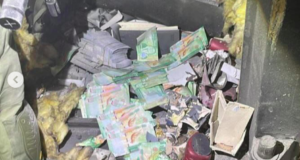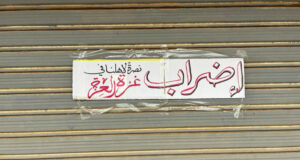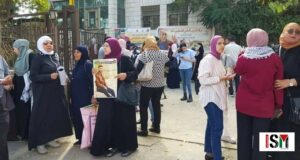by Joharah Baker
Published at Palestine Report on August 31, 2005
The road to Bir Nabala has always been rocky. Whether the traveler comes from Jerusalem or Ramallah, the turn toward Bir Nabala from Al Ram intersection has never been a pleasant trip. Potholes and unpaved sections of the road have proven detrimental to cars and the ubiquitous dust clouds make leisurely walking an impossible feat.
Nonetheless, the trip, unpleasant as it may be, has never been impossible. Nestled in between Jerusalem and Ramallah, Bir Nabala has long acted as a go-between for people of both cities.
That is until Israel decided to build its West Bank separation wall around Jerusalem, closing off all Palestinian communities around it, Bir Nabala included.
According to the UN’s Office for the Coordination of Humanitarian Affairs’ (OCHA) June 2005 humanitarian update, the separation wall will create the so-called “Bir Nabala enclave. This enclave includes five villages, all part of what the PLO Negotiations Affairs Department considers Metropolitan Jerusalem: Bir Nabala, Al Jib, Judeira, Qalandia town and lower Beit Hanina. With the wall effectively cutting off all West Bank areas and even parts of Arab East Jerusalem from the center of the city, Bir Nabala, located about 10 kilometers north of Jerusalem will be virtually isolated, encircled from all sides.
The enclave, in which more than 15,000 people live, will be linked to Ramallah by underpasses and a road fenced from both sides. The above ground highway, which currently links northern-area Jewish settlements such as Givat Zeev to Jerusalem, will become an Israeli-only road. Residents of Bir Nabala, mostly West Bank ID holders, will have no further access to Jerusalem save if they obtain special permits from Israeli authorities and travel through the Qalandiya checkpoint via Ramallah. Even the town of Al Ram – currently a five-minute drive away, will be virtually inaccessible to the people of Bir Nabala, except through a “detour” through Ramallah and back again.
“We still don’t know exactly what is going to happen,” says Yousef Abed, a social science and Islamic history school teacher and also coordinator for the Popular Committee for Resisting the Wall, a grassroots committee put together by representatives from the five villages. Still, he has a pretty good idea.
Peering down at a large aerial map of northern Jerusalem, Abed smoothly traces the steady orange line that is the wall. Like an insidious snake, the wall, once completed, will encircle Bir Nabala from three sides, swallowing up hundreds of dunams of land. The eastern sector of the town, or Al Mawahel, which now connects to the main Jerusalem-Ramallah Road will most likely be cut off in the middle by an Israeli patrolled gate.
“Most of the people living on this road have Jerusalem ID cards and hired a lawyer so that the gate would not put them on the Bir Nabala side,” Abed says with a hint of resentment. The fact is the gate will also divide families from Bir Nabala from one another, families who will only be able to reach each other by traveling via the Qalandiya checkpoint. Abed says there are a total of 1,200 people or 200 families who will be severed from Bir Nabala proper once this gate is set up.
For years, scores of Jerusalemites have made Bir Nabala a place for both their homes and businesses, given that housing is less expensive and business in the West Bank is often more profitable than in Israeli-occupied East Jerusalem. Now, however, many are returning to Jerusalem as the ominous shadow of the separation wall looms over them.
“We estimated that 2,000 Jerusalem ID holders have left Bir Nabala already,” says Abed. That is a large chunk, if you consider that over half of Bir Nabala’s population, which Abed puts at approximately 8,000, are not from the village itself.
Abu Marwan, however, says he is willing to sweat it out. The owner of the “Engineering for Electrical Motors” shop in the heart of Bir Nabala, Abu Marwan is as easy-going as they come. A father of three, this businessman from Jerusalem says he will not abandon his Bir Nabala store unless he absolutely has to.
“This is my sixth year in Bir Nabala,” he says. “I am not thinking of moving shop. Not unless I have to.”
Abu Marwan, who admits he left his store in East Jerusalem to begin business in Bir Nabala in order to avoid the high Israeli-imposed taxes in the occupied city, is optimistic that business will continue, even with the wall. “Maybe I will find business from neighboring villages,” he says.
This seems to be a long shot given the slump in business since the Intifada began five years ago. “For me, business has gone down 90 percent since the Intifada,” Abu Marwan estimates. “At first it dropped slowly, but now with people afraid of what is going to happen when the wall comes up, it has been reduced to a trickle. It is like a leaky faucet,” he says with half a smile.
And unlike most Jerusalemites, Abu Marwan is not intimidated by the Israeli threat to confiscate the ID cards of those who do not make their “center of life” in Jerusalem. “The Jerusalem ID card does not define me,” he says defiantly. “Even if they take it away, it is no big deal.” For him, the only real benefit to having residency status in Jerusalem is the accessibility to medical insurance at Israeli hospitals. “That is the one thing that really holds us to it.”
For the people of Bir Nabala, medical facilities are fast becoming a major concern. After the wall goes up, Al Maqassed Hospital and Augusta Victoria Hospital, the two major Arab hospitals in East Jerusalem will be out of reach. Ramallah’s hospitals will become their only viable solution, but with only one access road to this major West Bank city, one guess is as good as the next on how fast and how easy it will be to actually get there.
The underpass, which is currently under construction, will run from the middle of Bir Nabala, through the adjacent town of Judeira and Qalandiya town before opening onto Ramallah. Israeli authorities also said they planned to establish six agricultural gates in the Bir Nabala enclave, so farmers may have access to the land.
Or at least the land left over after Israel finishes with it. According to both Abed and a copy of Israeli military order T-10-05, 147 dunams of land from Bir Nabala will be expropriated for the wall’s infrastructure in the southern sector of the town. An additional 360 dunams just behind the wall will also be expropriated. Although the wall will not be built on top of this land, it will be rendered useless to the people.
This is not the first time land from Bir Nabala has been confiscated by Israeli authorities. Back in 1996, 800 dunams of land from this village alone were fenced off and labeled “green area”. On the mountainside below the Tomb of Samuel, the rows of olive trees and rolling green fields all became one of Israel’s “nature reserves”. The land – and olive trees – all belonged to Bir Nabala residents, some even belonging to Abed’s family.
Schools are another concern for Bir Nabala. While some students attend the village’s four small government schools, many find their education outside its boundaries. Many private schools are either in Jerusalem, Ramallah or somewhere in between in Dahiet Al Barid or Shufat.
Nur, a shy, soft-spoken high school senior goes to the Iman School in Shufat. In the past, crossing the checkpoint at Dahiet Al Barid never posed a problem, especially since she was “under age” – Israeli authorities do not require anyone under the age of 16 to carry any form of identification. However, this summer, as Nur took preparatory classes for the high school matriculation examination, the Tawjihi, she was forced to take dangerous back roads to circumvent the checkpoint to be able to reach her school.
With the start of classes last week, Nur tried a different tactic. “I heard if you prove you are going to school, they will not bother you at the checkpoint,” she said. With a letter from the school in hand, Nur now crosses the checkpoint unhindered.
Still, once the wall is up and the gate severing Bir Nabala from the main road to Jerusalem is closed off, Nur and her sisters – who also go to schools on the other side of the checkpoint – can only hope that some kind of solution will be offered. With the pressures of the Tawjihi already pressing down hard on this studious young woman, the wall is just an added burden. “The terrible thing is not knowing,” she says. “All we can do is hope.”
 International Solidarity Movement Nonviolence. Justice. Freedom.
International Solidarity Movement Nonviolence. Justice. Freedom.


